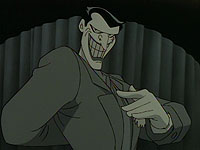 |
The Joker: He Who Laughs Last
by Scott Summers
 How uncomfortable it must be to encounter the Joker at a cocktail party! You deliver one of your drollest anecdotes, skillfully drawing it out to maximize the punch line, and there he is laughing at you, not with you. He’ll always slip in that tiny stiletto of contempt, making sure you don’t get the last word, drawing the room’s eyes back to the purple velour coat and bolo tie with which he made such an ugly but memorable entrance. No matter how many grass-green apple martinis he’s tipped into that toothy gullet, he’s never going to let you run away with the crowd. And then, as if to clap a lid on the unpleasantness of it all, comes the laugh—a little like the screech of a bobcat or an uncut diamond etching glass, and every bit of it at your expense.
How uncomfortable it must be to encounter the Joker at a cocktail party! You deliver one of your drollest anecdotes, skillfully drawing it out to maximize the punch line, and there he is laughing at you, not with you. He’ll always slip in that tiny stiletto of contempt, making sure you don’t get the last word, drawing the room’s eyes back to the purple velour coat and bolo tie with which he made such an ugly but memorable entrance. No matter how many grass-green apple martinis he’s tipped into that toothy gullet, he’s never going to let you run away with the crowd. And then, as if to clap a lid on the unpleasantness of it all, comes the laugh—a little like the screech of a bobcat or an uncut diamond etching glass, and every bit of it at your expense.
The worst of it all, other than his annoying tendency to casually kill the people he meets, is that you know others just like him. Worse, actually, since they don’t announce themselves with Easter-egg haute couture or a permanently nasty grin. When you meet them they’re all smiles and blarney, but their twinkling eyes appraise you as either a worm on a hook or the fish they’ve been trolling for. You might politely say these people suffer from antisocial personality disorder, or call them psychopaths or sociopaths. They function at all levels of society, from gutter snake to Vice President, and don’t care a whit for the feelings of other human beings. (A possible exception is often the sociopath’s mother, who possesses the singular clout and distinction of having brought them into the world to begin with.) All the sociopath ever really wants is to put one over on the next guy, to have the last word, to exert his power—whether that means cadging a meal with a clever line of bull or taking the stockholders for a few billion before the SEC closes in.
Likewise, with that hyena-on-nitrous-oxide laugh, the Joker lets you know he has you exactly where he wants you, that he’s the one dispensing the punch lines. When he laughs at you, he’s celebrating your insignificance. God forbid, then, that you should steal his gag, as Harley Quinn dared to do, or as Batman does by foiling his plots. That would mean usurping Joker’s power, which is punishable by grinning, cackling death. So by repeatedly whisking away those mustard-gas whoopee cushions before they go off, Batman represents an affront to the Joker’s entire self-concept. It drives the Joker down to brass tacks: in down-and-dirty combat, he throws aside the acid-squirting flowers in favor of switchblades and Uzis. He never drops the laugh, of course, but in such circumstances he deploys it with a more vital desperation.
Killing Batman is the last and greatest test of his power, which Joker makes clear when he snaps back at Lex Luthor for calling Batman a mere mortal: “There’s nothing mere about Batman.” Cut down the Bat and you simultaneously diminish the Joker, as the continued existence of an unbeatable, unflappable Batman defines the Joker’s life by opposition. Consider how personally Joker takes it when anyone else gets between him and Batman—Sid the Squid, for instance, or Harley Quinn when she chains Batman over a piranha tank. In the second case, Joker goes berserk, throwing his girlfriend out the window; in the first, he mourns the loss of a chance to shiv the Bat, shedding a tear for himself alone.
At the next Gotham City soirée, then, here’s what to do—especially if the mayor is in attendance, as those pesky supervillains are always popping in for a cocktail weenie when he’s around. If you’re prepared to trade quips with the Joker, have no qualms about sacrificing your pride. Let him have the last word. Laugh at his jokes, but then again, not too loudly. Avoid remarking on the green bolo tie they weren’t wearing last year, or the obviously fake carnation in his lapel. And whatever you do, don’t mention Batman.
DSM-IV-TR Diagnosis: 301.7 Antisocial Personality Disorder
Back to Pamela Isley |
Forward to Paige Monroe |